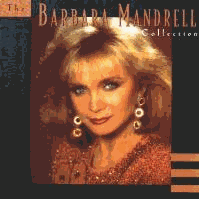|
Article on CD inlay
One of the biggest stars in country music was a child prodigy musician dubbed "The Princess of Steel," for both her early pedal steel playing abilities and her strong personality. Barbara Mandrell was born in Houston, Texas on Christmas Day in 1948 to a singer/guitarist father and a piano playing mother. Since Mrs. Mandrell also taught music, Barbara could read notes before she could read words. She could also play the accordion, banjo, bass guitar, fiddle, pedal steel, mandolin and saxophone at a very young age. Once visit to Nashville and the Grand Ole Opry was all it took to encourage Barbara to seek out a record deal and a full-time career in country music.
She first hit the airwaves in 1969, and within two years, her songs were at the top of the Billboard charts. Critics quickly warmed to the tiny blond with the big, smoky voice, calling her music "blue-eyed blues" and her stage performances "electric." She went on to win nearly every award country music has to offer. She was named Entertainer of the Year and Female Vocalist of the Year by both the Country Music Association and the Academy of country Music, and she took home countless awards by publications such as Billboard, Radio & Records, and Music City News.
In 1987, Barbara signed with EMI America and released on of the most powerful songs of the decade: "Child Support," written by Thom Schuyler. The song sent a pointed message to parents who shun responsibility for their offspring, and Barbara spoke out about children's rights during the time. In 1988, she released a song penned by country outlaw Waylon Jennings and his pal Roger Murrah, "Angels Love Bad Men," with Waylon joining in on vocals. In August of 1988, she released "I Wish That I Could Fall In Love Today," an up-tempo Harlan Howard song the hit top-5 on Billboard's charts. Harlan contributed another song on this collection, "The Key's In The Mailbox," which had been a hit for Freddie Hart in 1960. Hillary Kanter's "I'll Leave Something Good Behind" was an especially poignant release, since Barbara's near-fatal 1984 car accident still played heavily on her mind and on the minds of her fans. Other top tunes included here are "Mirror Mirror," "Feed The Fire," and "You've Become The Dream." This collection shows the depth and breadth of a performer who has reached the heights of county music stardom. The songs have meaning and substance and her "blue-eyed blues" have never been better. This is Barbara.
--Patsi Cox
|
|



